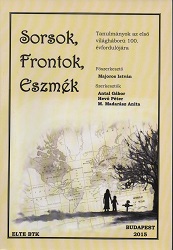Az első világháború következményei a kelet-közép-európai kisállamok geopolitikai sorsában
Consequences of the First World War for the Geopolitical Fate of the Small Countries in Eastern Central Europe
Author(s): Imre Garaczi
Subject(s): Comparative history, History of ideas, Political history, 19th Century, Pre-WW I & WW I (1900 -1919), Post-War period (1950 - 1989), Present Times (2010 - today), Geopolitics
Published by: Eötvös Loránd Tudományegyetem, Új-és Jelenkori Egyetemes Történeti Tanszék
Keywords: the concept of Eastern Central Europe; geopolitics; World War I; globalisation; types of nationalism; mentalitie;
Summary/Abstract: From the beginning of the 19th century, the newly emerging nationalistic sentiments characteristically took the guise of some ideology (other than nationalism). People belonging to small ethnic groups felt their authentic national existence threatened by the frequent recurrence of dynastic hegemonies on the one hand, and the interests of neighbouring nations on the other. At the same time, nationalism provided fuel for courage to face the future and possibly build a more fortunate and more modern society. Nationalistic sentiments were in the beginning tied to various other ideologies but from the start of the 20th century they became ideologies in their own right. This phenomenon continued to exist in Eastern Europe after World War II, even under Soviet dominance. In my paper I examine mental factors in the region and their effects on the situation that emerged throughout the 20th century.
Book: Sorsok, frontok, eszmék. Tanulmányok az első világháború 100. évfordulójára
- Page Range: 339-351
- Page Count: 13
- Publication Year: 2015
- Language: Hungarian
- Content File-PDF

